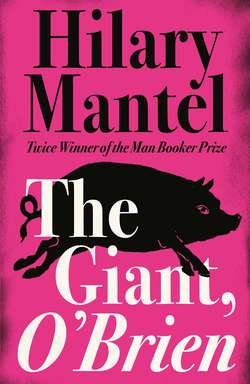Читать книгу The Giant, O’Brien - Hilary Mantel - Страница 8
3
ОглавлениеMy brothers are James, lately dead; John, dead. Andrew, dead. William is living but gone away. My sisters are Elizabeth, dead. Agnes, dead. Isabella, dead. Janet, dead.
I have also one sister living yet. Her name is Dorothea. We call her Dolly, when we are in a lighter mood.
Our family suffers from rotten lungs and rotten bones.
The John who is dead is not to be confused with me, the younger John. I say this because though in most cases the dead and the living are quite unalike, there are special circumstances when it is difficult to distinguish one from the other. There are many accounts, some from antiquity, of unfortunate people buried alive. Such burials may be the origin of quaint stories, stories of vampyres and ghouls and hauntings; of voices from underground, and the earth welling with fresh blood. But I have been in a small room with many a dead man and woman. I have slept under a dissecting bench in brother Wullie’s workroom, and I have hauled many a corpse to its final resting place on Wullie’s narrow bench. I can tell you that there are no ghosts. If there were, they’d haunt Wullie, would they not?
And haunt me. But don’t think it. It’s a slab of butcher’s meat you have to haul, head waddling and hands flapping; the rigor’s passed by the time their keepers knock at the door, and they’ve once again a semblance of flexible life, yet they’re heavy, they don’t help you, you have to drag them, and their faces are fallen in, their noses are rims, sharp edges of falling flesh, and their lips are invisible already, shrunk back against the gum.
So why are the living sometimes confused with the dead? Often the physician or surgeon is to blame, for his lack of care. But there are other occasions when even the keenest will not detect a pulse, yet the pulse exists. There are times when the breath does not lift the ribs, nor mist a mirror, nor stir a feather, but the corpse is breathing still. I have heard that sometimes when people fall into deep water, deep water that is very cold, they may remain chill and extinguished for an hour or more, and yet the spark of life is flickering within them; when warmth returns to their organs, when it spreads to their limbs and their heart and their muscles gather strength—why, then they may sit up, and speak, to the horror and astonishment of the mourners.
This is what I have heard: although, unfortunately, I have had no opportunity of making actual experiments upon drowned persons.
The house is built of stone, a farmhouse, built on ground that is thin and poor. In his family, he is the tenth child, and the last. When there is no room at the fire, he is kicked out into the yard.
Gradually, as he sees his siblings carried to the churchyard, room is made, but by then he is not accustomed to hearthside comforts, and the company of those who remain makes him uneasy.
At six years old he is sent out into the fields to pick stones, and also to scare crows. The crows watch him for any advantage. They circle in the air, talking about him in their intelligent voices. Sometimes he thinks they are plotting to take out his eyes.
Once your eyes are out you can’t get a second pair. He pictures himself flipping on his back like a landed fish, his spine flexing and arcing, beating the ungiving ground with the flat of his palms. The first scream is practising to come out of his mouth and the first stream of vomit. The crows have got his eyes in their beaks and are toddling over the ruts in the direction of East Kilbride.
There never was a man that wanted to be a great man ever was a great man. My present state of life I neither thought of nor could imagine. I am not a rich man, in fact I am poor, yet not poor in esteem; I say without boasting – pride not being in my nature—that the finest medical scholars of Europe have written me testimonials, and the most eminent surgeons in these islands and beyond crave for their sons a place at my table. And how, as the unmannerly Scots lad I am, could I have predicted this eminence?
While my brothers prospered at the academy, my school was the moor, hedge and field. I asked questions to which few knew the answer and none cared to give it. Why do the leaves fall? Why do the birds sing? They would hit me across the ear and shove me out into the stark, away from the smell of humanity. In the end I preferred it so, I liked the keen wind against the smoky fug, my silent company against their chattering. My outdoor life, the labour to which I was born, hardened my hands and my spirit. I was thought of small account, and believed I was. My eyes followed the turning leaf, the bird in flight, the moon’s phases.
His father, fifty when he was born and suffering with the gravel, frequently hit him across the ear. Mostly; whenever he saw him. This went on until he was thirteen, when his father died. By then he had acquired a high-shouldered look, and a habit of trying to see behind him.
